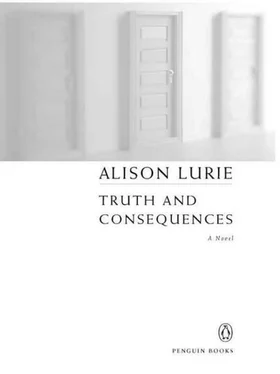“Don’t worry, I’ll take care of it.” Jane picked up the glass and ice cubes, ran to the kitchen, and returned carrying a pan of warm water and detergent and a sponge.
“Aw, shit, look at the mess,” Alan growled.
“Don’t worry, it’s nothing,” she assured him.
“It’s the drugs, they interfere with my coordination.”
“Yes, of course,” Jane said as she knelt by the sofa, mopping up the juice, then soaking the carpet with water and detergent, while thinking that she too did not need this, but that at least it hadn’t been grape juice.
“I wish I could help—”
“It’s all right, really. It’s nothing.” She went to the kitchen, dumped the dirty water, rinsed the sponge and brush, and filled the pan again with clean warm water. Back in the sitting room she scrubbed the suds off the carpet and patted it dry with a wad of paper towels, then returned to the kitchen again and washed everything out.
“Ja-ane,” Alan called. “When you’re finished, could you possibly bring me another glass of grapefruit juice?”
“Yes, just a minute.” She put the pan in the drying rack.
“Okay. Here you are,” she said a few moments later, aware of forcing her voice into a pleasant neutrality.
“Thanks. You’re so very good to me, darling.” Alan smiled at her briefly, sighed, and drank.
“You’re so very welcome,” she said. The words sounded flat in her mouth, but he did not appear to notice.
“I’m so lucky to have you here. It makes all the difference.”
Between what and what? Jane thought, but did not say.
“It’s those goddamn stairs in Mahoney Hall. They get me every time.” Alan’s office was on the top floor of the high-ceilinged architecture building, which had no elevator.
“I know. It’ll be easier next month when you move into the Center.” Last term Alan had been appointed as one of the two Faculty Fellows of the Matthew Unger Center for the Humanities, familiarly known as the Much, and sometimes as the Too Much. This was an endowed facility for visiting scholars and artists housed in a handsome Victorian mansion just off campus. Jane, for the last five years, had been its administrative director. The idea that Alan should become a Fellow had not been her idea, and the appointment had made her anxious, in case people should think so. But it had also made her grateful and pleased. For a whole year Alan would be relieved of teaching, which had become harder and harder for him. He would have peace and quiet and no stairs to climb and be able to finish his new book.
“I hope so,” Alan said in the voice of one who doubts this.
“I’m sure it will.”
No answer. “I’m going out to the garden now,” she said. “Is there anything else I can get you?”
“No thanks. Well, if you see the Times around anywhere.”
“Of course. I think it’s in the dining room.”
Back in the kitchen at last, washing the last of the lettuce, Jane waited a couple of minutes to see if any further requests would follow, then took up her basket and almost fled from the house.
It’s not right, it’s not how the story was supposed to turn out, she thought as she knelt in the garden pulling long, sticky, scratchy pale-green strings of bindweed out of the strawberry bed. That was stupid, it was silly and romantic: but Jane had once been romantic, though almost nobody who knew her now would have suspected this. At work she appeared practical, rational, and calm. Nobody would have guessed that twenty years ago, long after she knew the phrase to be foolish, she had clung to the belief that one day her prince would come, and that he would appear at the University. That was partly why she had stayed so long in an entry-level job at what her father always called “the big store at the top of the hill.”
Most of Jane’s many relatives, including those who also worked at the University—running offices and laboratories and lunchrooms, keeping up the grounds, or repairing office machines—had wondered at her decision. They believed that the faculty, on the whole, consisted of incompetent ninnies. Only Jane’s mother, who was also somewhat of a closet romantic and considered a wedding the high point of a woman’s life, saw it differently. “It doesn’t pay much,” she admitted. “But maybe you’ll marry one of those professors.”
Jane did not say so, but it was what she hoped for too. And as it turned out, not in vain. At twenty-four, when many of her friends were already married, she remained single. Because she was lively and pretty, with curly reddish brown hair and the look of a small friendly Welsh terrier, she had many suitors. Though some of them were attractive and likable and ambitious and already becoming successful, none of them, in her view, were princes. Somewhat discouraged, but refusing to compromise, she continued working at Corinth University, now at a more responsible job in the Entomology Department, all of whose unmarried male faculty, according to her fellow staff members, resembled different species of bugs.
Then, miraculously, Jane’s prince appeared. He was an expert on architectural history, called in to consult on the possible preservation or demolition of the Biological Sciences Building. Alan Mackenzie was only thirty-six, but already an associate professor, and he even looked like a prince. According to one of his colleagues whom Jane met later, his friendly but slightly formal manners, his pale-brown wavy hair, and his classical musculature suggested the ideal Renaissance courtier. He came from the romantic state of California, and his attitude toward the world was curious, skeptical, and easygoing. And, unlike a couple of instructors whom Jane had briefly dated, he did not condescend to her because she had gone to a local branch of the state university.
In time, her prince had become a king: a wholly admirable and lovable man, a world-renowned expert on eighteenth-century architecture, and the holder of an endowed chair at Corinth University. Meanwhile, Jane had continued to work at increasingly interesting and well-paid University jobs. For more than sixteen years she had been lucky and happy.
And now all that was over. She sighed heavily and slumped into a crouching position against a bale of straw mulch. Over the last fifteen months, her admired and beloved king had turned into a kind of shabby, whiny beggar. Like the tax inspector, the FBI man, and the hitchhiker that he had reminded her of earlier that morning, he always wanted something, something she didn’t always want to give and he didn’t always need. No, no, I mustn’t think that way, Jane told herself, digging into the earth and pulling up not only bindweed but, by accident, a long pale-red runner of next year’s strawberries. But it was too late—the idea had already appeared in her mind and was sitting there heavily, as if glued in place.
A dirty wave of guilt and self-hatred washed over her. How can I mind doing things for Alan or think such mean, selfish thoughts, when I am well and he is in such pain—when I promised always to love him and cherish him, for better and worse, in sickness and in health?
Maybe the most awful thing about it all was that she wasn’t a good person anymore. All her life, ever since she was a seven-year-old at Sunday school, it had been Jane’s secret plan to be good. Already in second grade she had known that she wasn’t remarkable in any way—not exceptionally intelligent or gifted or strong or beautiful. Well, all right then, she had decided, she would be good. Not heroically good: just reasonably decent, honest, fair, and kind. A good girl, a good woman, a good wife. She had never confided this ambition to anyone—to do so would have been to invite ridicule and possibly retribution. But for most of her life she had managed pretty well, though of course there had been lapses. When she went to church with her parents on Christmas and Easter, she usually felt that God (if he existed) understood and pardoned her failings. Now she felt that he was angry with her, even scornful.
Читать дальше







![Кэмерон Доки - Правда и ее последствия[Truth and Consequences]](/books/79610/kemeron-doki-pravda-i-ee-posledstviya-truth-and-con-thumb.webp)




